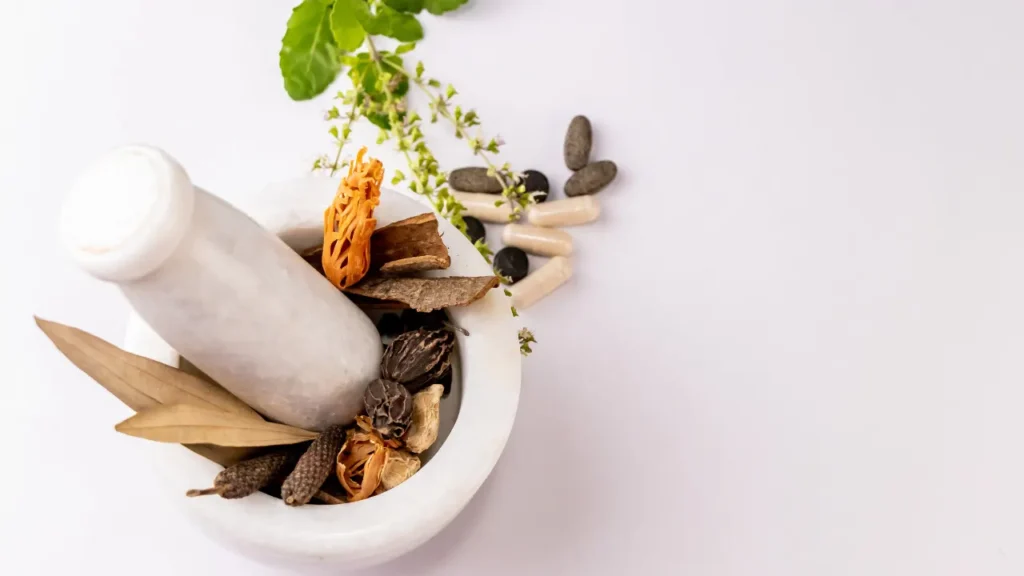Black root, also known as Culver’s root or Veronicastrum virginicum, is a perennial herbaceous plant that is indigenous to North America. Its scientific name is Leptandra virginica. Native Americans and early European settlers have long utilized it for its therapeutic benefits, especially for treating liver and digestive disorders. Black root has gained popularity in recent years as a dietary supplement, and studies have looked at its potential health advantages. This review seeks to offer a thorough examination of the chemistry, health advantages, recommended dosage, adverse effects, potential drug interactions, and safe usage of black root.
You May Also Like:
Should You Try CBD for Focus? Here Are the Facts.
Diamond CBD Gummies vs. Joy Organics CBD Gummies
Black Root: Benefits, Dosage, Side Effects, Drug Interactions, and Other Important Information is an original (NootropicsPlanet) article.
Nature of Black Root
A perennial herbaceous plant in the Plantaginaceae family, black root. It has lance-shaped leaves and spike-like clusters of white to pale purple flowers, and it can reach heights of 3 to 7 feet. The plant is indigenous to North America, most specifically the eastern, central, and southeastern United States and Canada. Meadows, prairies, and open forests are examples of damp settings where black root flourishes. The plant’s medicinal benefits are primarily derived from its roots, which have an appearance that ranges from dark brown to black.
Health Benefits of Black Root
- Effects on Hepatoprotective: Black root’s iridoid glycoside content has been implicated in its hepatoprotective abilities. These substances have been demonstrated to possess anti-inflammatory and antioxidant properties, which can shield the liver from harm brought on by a variety of toxins. For instance, a rat study showed that leptandrin treatment reduced oxidative stress and inflammation, protecting against carbon tetrachloride-induced hepatotoxicity (1). Veronicastrumin was found to lessen liver damage in mice given acetaminophen by controlling the expression of pro-inflammatory cytokines and boosting antioxidant defence mechanisms (2).
- Health of the digestive system: Traditional remedies for digestive problems such as constipation, indigestion, and bloating include black root. The herb’s laxative effects are a result of its capacity to increase bile synthesis in the liver, which helps break down lipids and promotes food transit through the digestive system. Additionally, it has been demonstrated that the iridoid glycosides in black root can modulate gastrointestinal secretion and motility, enhancing overall gut function (3). These characteristics imply that black root might be a beneficial supplement for enhancing digestive health.
- Immune Assistance: Black root’s iridoid glycosides, which have been demonstrated to promote the creation of immune cells and regulate the expression of pro-inflammatory cytokines, are responsible for the immunomodulatory activities of the plant. Deacetylasperulosidic acid therapy dramatically raised the quantity of white blood cells and decreased the production of pro-inflammatory cytokines, such as TNF- and IL-6, according to a study on mice (4). According to these results, black root may be a helpful dietary supplement for boosting immune system health, especially for those with weakened immune systems.

Chemistry of Black Root
Numerous bioactive substances found in black root contribute to its pharmacological properties. Iridoid glycosides including leptandrin, veronicastrumin, and deacetylasperulosidic acid are the root’s main chemical components. A class of monoterpenoids known as iridoid glycosides has a variety of biological properties, including as anti-inflammatory, hepatoprotective, and immunomodulatory actions. Black root also contains phenolic substances, such as flavonoids and phenolic acids, which are highly effective antioxidants. These phytochemicals are in charge of neutralising free radicals and defending cells against oxidative stress, a major factor in a number of chronic diseases.
Physiological Mechanisms of Action
The bioactive chemicals in black root, which have varied physiological effects on the body and brain, are responsible for the health advantages. The main mechanisms of action are as follows:
- Antioxidant Activity: The flavonoids and phenolic acids found in black root have strong antioxidant capabilities. They can neutralize free radicals and reactive oxygen species, protecting biological components like lipids, proteins, and DNA from oxidative damage. This defence against oxidative stress lowers the risk of chronic illnesses linked to cellular damage and inflammation.
- Anti-inflammatory Effects: Black root’s iridoid glycosides are proven to have anti-inflammatory properties. They have the ability to control the production of pro-inflammatory cytokines including interleukin-6 (IL-6) and tumour necrosis factor-alpha (TNF-), which are essential for the beginning and development of inflammation. Black root could enhance general health by preventing the release of these cytokines, which could assist to reduce inflammatory diseases.
- Hepatoprotective Effects: Leptandrin and veronicastrumin are two examples of the iridoid glycosides found in black root that have hepatoprotective effects by lowering oxidative stress and liver inflammation. They have the ability to downregulate the production of pro-inflammatory cytokines and upregulate the expression of antioxidant enzymes including superoxide dismutase and catalase. These activities maintain healthy liver function and safeguard liver cells from harm.
- Digestive Benefits: The iridoid glycosides in black root can interact with smooth muscle cells in the digestive tract, promoting intestinal contractions and facilitating the passage of food.
- Modulation of Gastrointestinal Function: Black root has been shown to improve gastrointestinal function by promoting bile production in the liver and modulating gastrointestinal motility and secretion. This result helps explain why the herb has historically been used as a laxative and digestive aid.
- Immunomodulation: The iridoid glycosides of black root can increase the synthesis of immune cells and control the expression of cytokines that promote inflammation. For people with weakened immune systems, this immunomodulatory activity may be advantageous as it strengthens the body’s defences against infections.

Optimal Dosage and Administration of Black Root
The ideal black root dosage varies according to the needs and health situation of the individual. Boiling 1-2 gm of the dried root in water for 10-15 minutes has historically been used to make a decoction of the root, which can be taken up to three times per day. The usual dosage of dried root extract in capsules is 40 mg, taken 2–3 timess a day. To ascertain the person’s tolerance and the desired impact, it is important to begin with a smaller dosage and progressively raise it. As with any dietary supplement, it is important to speak with a doctor before starting a black root supplementation regimen, especially for people taking medications or with pre-existing medical conditions.
Side Effects of Black Root
In general, modest consumption of black root is regarded as safe. However, excessive consumption may result in unfavorable side effects like diarrhoea, nauseousness, vomiting, and cramps. The laxative and bile-stimulating characteristics of the plant are principally responsible for these effects. Furthermore, black root may result in allergic reactions in sensitive people, which may manifest as skin rash, itching, or breathing difficulties. Black root supplementation should be avoided by women who are pregnant or nursing because there is inadequate information on its safety during these times.

Potential Substance Interactions
Certain medications and black root may interact, changing or impairing the efficacy of the latter. Some possible substance interactions include the following:
- Anticoagulants: People taking anticoagulants like warfarin or heparin may experience more bleeding because of black root’s potential antiplatelet action. Before combining black root with these medications, it is imperative to speak with a medical professional.
- Diabetes meds: Black root has been shown to lower blood sugar levels, which may increase the hypoglycemic effects of diabetes treatments like insulin or metformin. When taking black root along with these drugs, it may be necessary to monitor blood glucose levels and change medication dosage.
- Diuretics: Black root may have diuretic effects, which can raise the risk of electrolyte imbalance and dehydration in people who take diuretic drugs. When using black root with diuretics, it’s important to drink enough water and keep track of your electrolytes.
Responsible Use of Black Root
The following recommendations should be taken into account when using black root as a dietary supplement to ensure safety and responsibility:
- Before beginning a black root supplementation regimen, especially for people with pre-existing medical disorders or those who are using drugs, see a healthcare expert.
- To ascertain a person’s tolerance and desired effect, start with a lesser dosage and progressively raise it.
- If any negative reactions or side effects develop, stop using the medication and consult a doctor.
- To assure purity and potency, pick premium black root goods from reputed producers.
- Adhere to the dosage and administration recommendations provided by the manufacturer.
Black Root:
Conclusion
Black root is a robust herb with a proven history of use in treating liver and digestive disorders. We all would be wise to explore its potential health benefits, including hepatoprotective, anti-inflammatory, and immunomodulatory effects, largely attributed to its iridoid glycosides content.
However, while offering therapeutic advantages, black root also poses risks of side effects and drug interactions, particularly when consumed in high doses or alongside certain medications. Therefore, it’s crucial for individuals to consult healthcare professionals before incorporating black root into their regimen, ensuring a safe and effective use of this herbal supplement.

References:
- Black Root. Retrieved from: https://www.digicomply.com/dietary-supplements-database/black-root#:~:text=Black%20root%20is%20a%20dietary,to%20help%20detoxify%20the%20body.
- Black Cohosh. Retrieved from: https://ods.od.nih.gov/factsheets/BlackCohosh-HealthProfessional/
- Black Root. Retrieved from: https://www.herbalreality.com/herb/black-root/
Important Note: The information contained in this article is for general informational purposes only, and should not be construed as health or medical advice, nor is it intended to diagnose, prevent, treat, or cure any disease or health condition. Before embarking on any diet, fitness regimen, or program of nutritional supplementation, it is advisable to consult your healthcare professional in order to determine its safety and probable efficacy in terms of your individual state of health.
Regarding Nutritional Supplements Or Other Non-Prescription Health Products: If any nutritional supplements or other non-prescription health products are mentioned in the foregoing article, any claims or statements made about them have not been evaluated by the U.S. Food and Drug Administration, and such nutritional supplements or other health products are not intended to diagnose, treat, cure, or prevent any disease.


